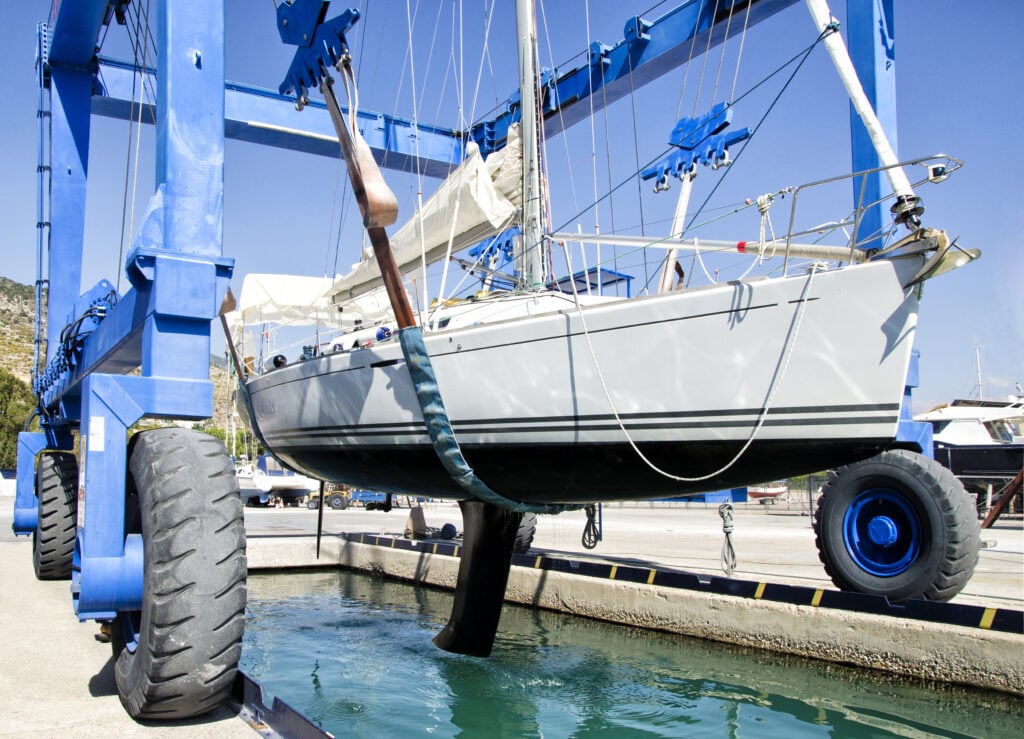When the seasons change and it is time to stow away your vessel, it is important to ensure it is prepped and ready for next year’s use. Regardless of whether you own a yacht, sailboat, jetboat, pontoon boat, or the latest model bass boat, the following article discusses how to properly protect and preserve your vessel throughout the storage process.
Removing Your Vessel from Water
The first step to preparing your vessel for its downtime is to remove it from whatever body of water it is currently in. Each boat is unique, making it important to know your vessel and the correct way to remove it from the water. Although you may not necessarily be doing this yourself, making sure that whichever marina or yard may lift your boat, haul it out, or assist in disassembly is prepared for your specific vessel can help ease the process.
 <
<
After Your Boat is Removed
After your boat is out of the water, it is time to truly start preparing it for nonuse. From looking over your boat to cleaning it in preparation for any potential repairs, this step is where most of the work begins.
- Clean Your Vessel
Washing your boat has a variety of benefits. For example, besides making your boat look new inside and out, power washing along with the occasional scrubbing of your boat can help prevent unwanted damage and water pollution. Cleaning your vessel will also give you the opportunity to look for any needed repairs or parts that should be replaced.
- Conduct an Inspection
After cleaning your boat allows you to better see the entire vessel, conduct an inspection and look for any possible repairs that may be needed. From bow to stern, check for any holes or punctures that may cause leaks in your hull or other components such as fuel or water lines. Examine other mechanical features of your vessel that are easy to view, such as the propeller, rudder, mast, and anchor system. You may want to enlist the help of a professional marine technician to ensure your boat and all of its various systems and components will be ready for next season.
- Check Electrical Components
Turn all batteries off or disconnect them completely. Disconnect all electronics to avoid shortages, electrical fires, or the depletion of your marine battery. Unplug any devices like gauges, depth finders, radios, and any other appliances that could cause an incident. Typically, vessels of high value are stored indoors, which means ensuring that your electrical system is safely restrained so as not cause an electrical fire is an even higher priority.
- Examine all Fluids
Examine your vessels’ fluids, from gas and oil to water and anti-freeze. Checking these fluids is important to avoid any corrosion and deterioration. If your boat has water in any of its systems it is recommended to remove it entirely, but if you are unable to do so, adding anti-freeze may reduce the risk of damage. Enlisting a marine technician for these tasks is recommended.
Storing Your Boat
Now that your boat has been thoroughly cleaned and mechanically examined, it is time to safely store it away.
- Find a Location
Finding the right place to store your vessel during the colder months is not only important for your boat’s safety, but also for your peace of mind as the owner. Deciding if you will be storing your boat at your own residence or at a separate facility may affect the way you cover your boat and the amount of security needed.
- Cover Your Boat
Where you choose to store your boat can affect the manner in which you choose to cover your vessel. Cover your boat with a tarp, cloth cover, or shrink wrap to protect against moisture and debris. Shrink wrap is recommended for boats being stored outdoors, while a boat being kept indoors might be able to be protected by using a tight-fitting cover to seal it. You don’t want anything finding its way in your boat that could cause damage.
- Don’t Forget the Accessories
Emptying your vessel completely of all life jackets, cushions, and other accessories is recommended to avoid any moisture build up or potential weathering. Also, don’t forget to remove food and beverages that may attract wildlife or freeze over the span of storage.

Insurance for Your High-End Vessel
Your boat is an investment that want to protect. Here at Cross Private Client Insurance, we can help you explore your options when it comes to insurance for your classic or modern-day boats. To find out more, contact your local Cross Private Client Insurance office today.
___________________________________________________________________
This article is for general informational purposes only and is not to be relied upon or used for any particular purpose. Cross Insurance shall not be held responsible in any way for, and specifically disclaims any liability arising out of or in any way connected to, reliance on or use of any of the information contained in this article. The information contained or referenced in this article is not intended to constitute and should not be considered legal, insurance, accounting or other professional advice, nor shall it serve as a substitute for the recipient obtaining such advice. The views expressed in this article are that of its author and do not necessarily represent the views of Cross Financial Corp. and its subsidiaries and affiliates (“Cross Insurance”) or Cross Insurance’s management or shareholders.
 <
<
